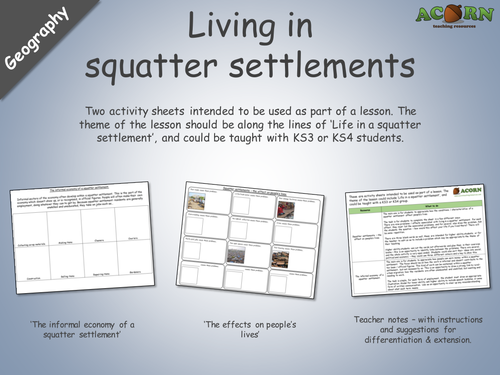

Two activity sheets intended to be used as part of a lesson. The theme of the lesson should be along the lines of ‘Life in a squatter settlement’, and could be taught with KS3 or KS4 students.
Resource 1: the effects on peoples lives
The main aim is for students to appreciate how the conditions / characteristics of a squatter settlement affect people’s lives.
The task is for students to complete the sheet in a few different ways.
There are nine problems / effects associated with living in a squatter settlement. For each effect, they must list the associated problems, and for several, also draw the problem. Ask the students the question – how would this affect your life if you lived there? There will be some repetition.
There are three blank cards as well, these are intended for higher ability students, or for the teacher to edit so as to include a problem which may be appropriate to the theme of their teaching.
Higher ability students can cut the cards out afterwards and glue them in their exercise books – this is an opportunity to identify links between the problems. There are several, and the whole activity is very open ended. Students could also sort their ideas into social, political and economic – they could use three different colours and a key to show this.
There are some answers on the next sheet, although there are many more.
Resource 2: the informal economy of a squatter settlement
The main aim is for students to appreciate how people can earn money within a squatter settlement. The focus should be on how the work is informal and doesn’t contribute to the tax base / official figures. This kind of work can be contained within a squatter settlement, but not necessarily so. This is an opportunity to draw a strong link to rural-urban migration; how the residents are often uneducated and unskilled, but wanting and needing to work.
The task is simple, for each form of employment, the student must draw an appropriate illustration. Model for lower ability, ask higher ability to include speech bubbles, or some form of written communication. Use as an opportunity to clear up any misunderstanding about what each term means.
All reviews for our paid resources have been 5/5* (as of March 19th 2017)
Resource 1: the effects on peoples lives
The main aim is for students to appreciate how the conditions / characteristics of a squatter settlement affect people’s lives.
The task is for students to complete the sheet in a few different ways.
There are nine problems / effects associated with living in a squatter settlement. For each effect, they must list the associated problems, and for several, also draw the problem. Ask the students the question – how would this affect your life if you lived there? There will be some repetition.
There are three blank cards as well, these are intended for higher ability students, or for the teacher to edit so as to include a problem which may be appropriate to the theme of their teaching.
Higher ability students can cut the cards out afterwards and glue them in their exercise books – this is an opportunity to identify links between the problems. There are several, and the whole activity is very open ended. Students could also sort their ideas into social, political and economic – they could use three different colours and a key to show this.
There are some answers on the next sheet, although there are many more.
Resource 2: the informal economy of a squatter settlement
The main aim is for students to appreciate how people can earn money within a squatter settlement. The focus should be on how the work is informal and doesn’t contribute to the tax base / official figures. This kind of work can be contained within a squatter settlement, but not necessarily so. This is an opportunity to draw a strong link to rural-urban migration; how the residents are often uneducated and unskilled, but wanting and needing to work.
The task is simple, for each form of employment, the student must draw an appropriate illustration. Model for lower ability, ask higher ability to include speech bubbles, or some form of written communication. Use as an opportunity to clear up any misunderstanding about what each term means.
All reviews for our paid resources have been 5/5* (as of March 19th 2017)
Something went wrong, please try again later.
Report this resourceto let us know if it violates our terms and conditions.
Our customer service team will review your report and will be in touch.
£2.00